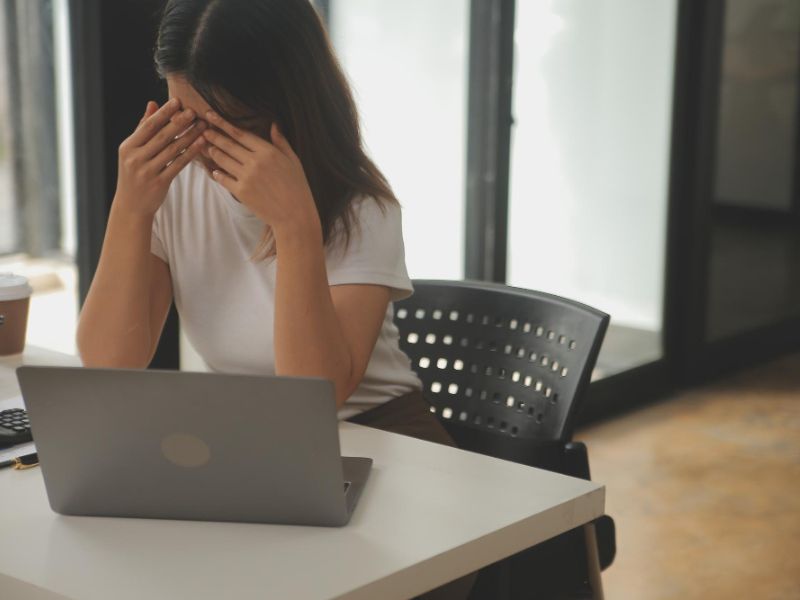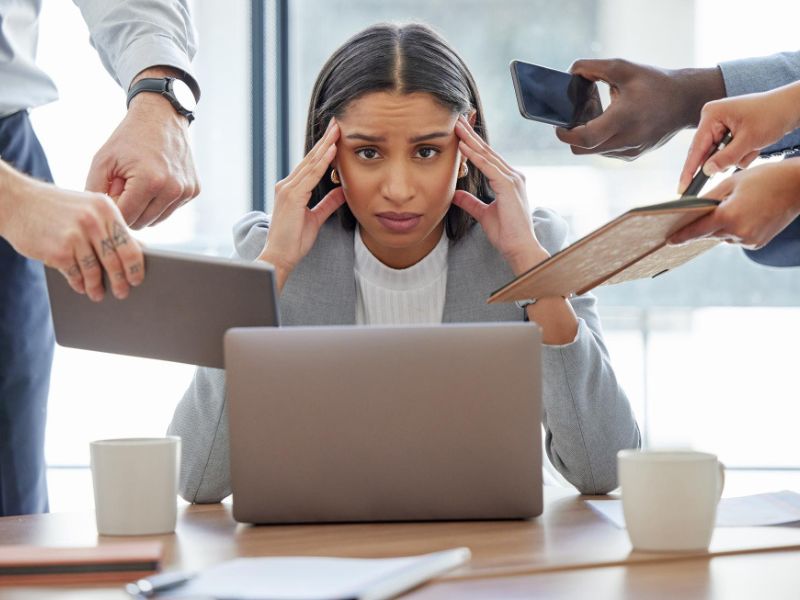April was Stress Awareness Month, which aims to raise public awareness of the causes and impact of stress, and find ways to help promote better mental health for all.
A total of 17.9 million working days were lost due to work-related stress, depression or anxiety in 2019/20. This highlights the scale of the challenge employers face in effectively supporting employee wellbeing.
Over the last year, the Covid-19 pandemic and national lockdowns have taken a further toll on people’s mental health. Research shows that 65% of people in the UK have felt more stressed since the Covid-19 restrictions began in March 2020 – with the three key causes for concern being feelings of disconnection, uncertainty, and a worrying loss of control. Helping employees manage stress has never been so important.
Reflecting on Stress Awareness Month, WeAreTheCity spoke to eight industry experts, to better understand how employers can help support employee wellbeing during this stressful period, and beyond.
Take a break
 According to the ONS, those working from home during 2020 did on average six hours unpaid overtime per week, with 74 per cent of UK adults feeling so stressed at some point over the last year they felt overwhelmed or unable to cope.
According to the ONS, those working from home during 2020 did on average six hours unpaid overtime per week, with 74 per cent of UK adults feeling so stressed at some point over the last year they felt overwhelmed or unable to cope.
“British workers put in some of the longest hours in Europe, and their ‘always-on call’ mentality often means working overtime without pay,” said Kathryn Barnes, Employment Counsel EMEA at Globalization Partners.
“It is crucial that employers encourage employees to find the right balance between work and play, reassuring them that working from home does not mean being ‘on’ 24/7. Checking in to see how employees are coping, looking out for signs of stress, and ensuring that employees are taking adequate breaks away from their desk, all demonstrate a commitment to employee wellbeing.”
 Martin Taylor, Deputy CEO at Content Guru describes how in some ways, flexible working has been beneficial for employees’ mental health. Speaking of his own team’s experience, he highlights: “Generally, pretty much everyone found it better for family life and fitness. Many have used the new flexibility to focus on their health.”
Martin Taylor, Deputy CEO at Content Guru describes how in some ways, flexible working has been beneficial for employees’ mental health. Speaking of his own team’s experience, he highlights: “Generally, pretty much everyone found it better for family life and fitness. Many have used the new flexibility to focus on their health.”
Indeed, Taylor believes that any plan to return employees to the office should focus on maintaining the most effective aspects of remote working. “The pandemic has had plenty of negative effects, but if businesses can bake flexibility into their long-term outlook, we’ll have a happier, healthier and more productive workforce long into the future.”
Kleopatra Kivrakidou, Channel Marketing Manager EMEA at Ergotron, agrees that employers need to ensure their people are appropriately equipped to deal with the real-life demands of long-term remote working as well as creating a hybrid workplace.
 “Encourage employees to log off at the end of the day at the right time and provide opportunities for employees to take time out to socialise with their colleagues (virtually or in-person). Opportunities to get away from the screen to talk to other members of staff is good for encouraging conversation, but also mental support.
“Encourage employees to log off at the end of the day at the right time and provide opportunities for employees to take time out to socialise with their colleagues (virtually or in-person). Opportunities to get away from the screen to talk to other members of staff is good for encouraging conversation, but also mental support.
“Although employees may be busy in their day-to-day work, it’s important to put health and wellbeing front and centre, by encouraging staff to take regular breaks from their screen. With most employees spending most of their time in their home-office, employers can help to create the right environment at home, so it’s less stressful and more productive.”
Added stressors
 Research from Trust Radius suggests that 57% of women in tech feel burned out at work this year, compared to 36% of men. “Whilst it’s not healthy to perpetuate a ‘men vs women’ attitude, women at work have more hurdles to overcome and so I believe this is a reflective statistic,” explains Sara Hamilton, Deputy Director of Product and Managed Services at Mango Solutions. “For example, as a woman in tech, you have to work harder to show or prove your worth, than male counterparts. Women also tend to feel more heavily scrutinised for things like sick leave for physical or mental health, because it can appear as “weakness” and so they push on when they shouldn’t.
Research from Trust Radius suggests that 57% of women in tech feel burned out at work this year, compared to 36% of men. “Whilst it’s not healthy to perpetuate a ‘men vs women’ attitude, women at work have more hurdles to overcome and so I believe this is a reflective statistic,” explains Sara Hamilton, Deputy Director of Product and Managed Services at Mango Solutions. “For example, as a woman in tech, you have to work harder to show or prove your worth, than male counterparts. Women also tend to feel more heavily scrutinised for things like sick leave for physical or mental health, because it can appear as “weakness” and so they push on when they shouldn’t.
“To help address this issue, employers should emphasise how there is no heroism in martyrdom or being seen to be working – the real money is in working effectively and sustainably.”
 From front line workers to security operations teams, different occupations also bring their own additional stressors. “Due to the unpredictable nature of data breaches, security operations teams commonly work in an always on state, which leaves many with the inability to switch off when they down tools for the day,” furthers Samantha Humphries, Head of Security Strategy, EMEA at Exabeam. “Even taking personal time off to relax can be tough to achieve.”
From front line workers to security operations teams, different occupations also bring their own additional stressors. “Due to the unpredictable nature of data breaches, security operations teams commonly work in an always on state, which leaves many with the inability to switch off when they down tools for the day,” furthers Samantha Humphries, Head of Security Strategy, EMEA at Exabeam. “Even taking personal time off to relax can be tough to achieve.”
She adds, “we continue to see a relentless volume of attacks and breaches, from phishing to ransomware to insider threats and unfortunately for some even nation state attacks. Coupled with extended periods of working from home in the last year for many of us, it has meant balancing parenting and home-schooling with professional responsibilities.
“It is vital for business leaders to check in with their valued security teams on an individual level. Acknowledge and validate, share advice and provide resources that can help, and most importantly celebrate the wins.”
Positive policies
 “Organisations need to view employee wellbeing as a strategic priority, supporting employees dealing with stress by equipping them with the awareness and resources they need to nurture their own mental health,” said Agata Nowakowska, AVP EMEA at Skillsoft.
“Organisations need to view employee wellbeing as a strategic priority, supporting employees dealing with stress by equipping them with the awareness and resources they need to nurture their own mental health,” said Agata Nowakowska, AVP EMEA at Skillsoft.
“Whether it’s providing access to health services, such as mobile apps where employees can ask for assistance from professionals, or hosting a virtual yoga class – there are many ways organisations can support employee wellbeing and promote good mental health for all.”
Liz Cook, People Director at Six Degrees highlights the initiatives her company has taken to support employees who may be suffering increased stress during these unprecedented times.
 “Along with bolstering our team of mental health first aiders and carrying out lunch and learn sessions on mental wellbeing, we have created working guidelines for wellbeing which reiterate that if people continue to need to work flexible hours due to personal reasons or commitments, it is still so important to ensure they take a lunch break for some time away from the screen and to get some fresh air. People should also consider the impact of sending emails or Teams messages outside of core hours, as they sometimes won’t appreciate the stress this can cause people receiving them.”
“Along with bolstering our team of mental health first aiders and carrying out lunch and learn sessions on mental wellbeing, we have created working guidelines for wellbeing which reiterate that if people continue to need to work flexible hours due to personal reasons or commitments, it is still so important to ensure they take a lunch break for some time away from the screen and to get some fresh air. People should also consider the impact of sending emails or Teams messages outside of core hours, as they sometimes won’t appreciate the stress this can cause people receiving them.”
Rob Shaw, MD EMEA at Fluent Commerce, also describes how his company provides employees with any support they may need: “We operate weekly Q&A sessions which enable our team to raise any work-related concerns, as well as providing a free counselling service our employees can access anonymously. Our flexible  leave policy also encourages the team to take time out if they need a mental, or physical, break.”
leave policy also encourages the team to take time out if they need a mental, or physical, break.”
“Cultivating a culture of care requires open discussions with the policies to back this up,” he concludes. “So whilst initiatives like Stress Awareness Month are great for starting the discussion – it’s imperative we keep the momentum going and make a positive change.”
WeAreTheCity covers the latest female centric news stories from around the world, focusing on women in business, careers and current affairs. You can find all the latest gender news here.
Don’t forget, you can also follow us via our social media channels for the latest up-to-date gender news. Click to follow us on Twitter, Facebook, Instagram, and YouTube.









